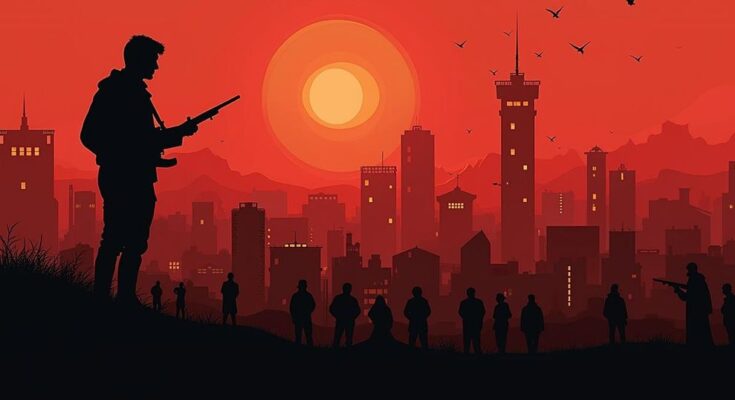Armenia confronts deep disillusionment following a devastating military defeat in Nagorno-Karabakh, resulting in 2,300 casualties and plunging support for Prime Minister Nikol Pashinyan. Once symbolizing hope and democratic reform during the ‘Velvet Revolution’ in 2018, Pashinyan is now labeled a ‘traitor’ and faces calls for resignation. The aftermath of the conflict exacerbates an economic crisis and leads to an influx of refugees, while public sentiment remains divided and discontent grows among a once-hopeful citizenry.
Armenia’s once-hopeful political landscape has been marred by a catastrophic military defeat in Nagorno-Karabakh, resulting in over 2,300 casualties and a significant decline in public support for Prime Minister Nikol Pashinyan’s reformist government. In Yerevan, the capital, young soldiers and displaced families express their despair following the brutal conflict that lasted 45 days, which saw Armenia face Azerbaijan, supported by Turkey. The spirit of the “Velvet Revolution,” which brought Pashinyan to power in 2018, feels like a distant memory. The peaceful uprising, characterized by widespread support, aimed to eradicate corruption and usher in a new political era. Yet, following the war, priorities have shifted dramatically, as the public grapples with loss, an influx of refugees, a resurgence of COVID-19 cases, and looming economic difficulties. Pashinyan, once hailed as a hero, now faces accusations of betrayal for signing the ceasefire that acknowledged Armenia’s defeat. This abrupt decision led to a surge in opposition demands for his resignation, further complicating the political climate. Citizens are divided; while some remain loyal supporters, others express growing disenchantment, particularly after Pashinyan labeled the significant city of Shushi as a “sad and colorless little town.” Public demonstrations against Pashinyan are somewhat restrained, reflecting a fear of aligning with the previous regime that many despise. The conflict’s aftermath has left many young Armenians, who initially celebrated the revolution, feeling conflicted and disillusioned as they cope with their homeland’s realities. The economic ramifications of the conflict are dire, with an estimated one-third of the population living in poverty prior to the war. The crisis threatens to deepen, compounded by the influx of refugees and dwindling job opportunities. Analysts predict that unless substantial changes are made, many may seek to emigrate. As the nation reflects on its hopes for a brighter future, the specter of past sufferings and the harsh present loom large, provoking questions about Armenia’s path forward in a new geopolitical landscape.
Armenia, a country with a complex historical relationship with its neighbors, has undergone significant political transformation in recent years, particularly following the 2018 “Velvet Revolution,” which aimed to dismantle corruption and establish democratic governance. The conflict over Nagorno-Karabakh, a region with a predominantly ethnic Armenian population, has traditionally been a flashpoint for violence and tension between Armenia and Azerbaijan. The recent military clash, which resulted in Armenia’s substantial military losses, has reframed the public’s perception of the government and the revolutionary ideals that seemed to promise a new era of hope and progress.
The plight of Armenia following the Nagorno-Karabakh conflict highlights a tragic descent from the optimism that surrounded the Velvet Revolution. The casualties from the war, compounded by a rising economic crisis and loss of hope in the current government, have created an atmosphere of despair among the population. As public sentiment shifts and opposition grows, it remains to be seen how Armenia will navigate its challenges and whether the promise of a new political era can be revived amidst profound losses and changing realities.
Original Source: worldcrunch.com




